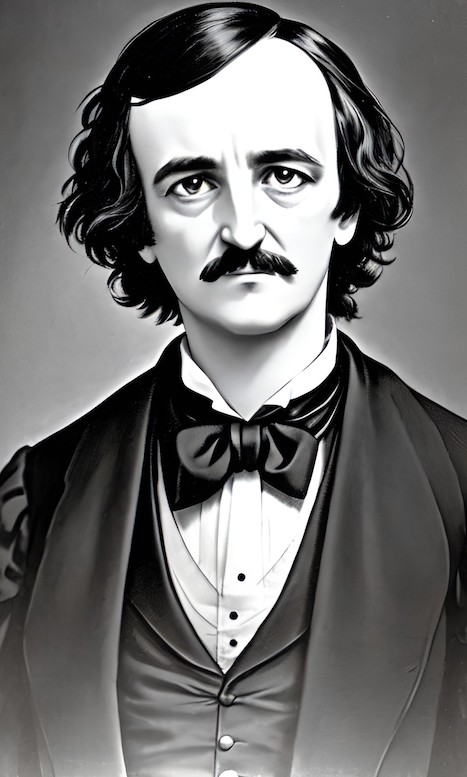Subscribe to my newsletter and get your free ebook: The Art and the Alchemy of Writing
- Home
- Kids Bedtime Stories
- Edgar Allan Poe Short Stories
Edgar Allan Poe Short Stories and Poems
are Not for the Faint of Heart

January 19, 1809 - October 7, 1849
Edgar Allan Poe short stories took life in the 19th century. He crafted short stories, poems, and novellas, leaving breadcrumbs of terror in the minds of those who dared to read his works. Yet, the reader must give credit where credit is due in the realm of suburb storytelling.
Poe had a troubled childhood that most likely started when his mother died when he was two years old. Matters did not improve when his father abandoned him and his siblings. Poe’s downward slide continued when he was adopted by relatives who neglected him emotionally.
As can be expected, Poe suffered long bouts of depression and struggled with alcoholism. Unsubstantiated claims have been leveled against him regarding drug use. Regardless, it’s apparent that his demons could not derail the strides he made toward greatness.
In Poe’s dark world, sparks of creativity ignited flames that fanned out into a superb writing ability of tales that spanned across centuries. He has gifted us with his one-of-a-kind works that have left their mark on literature around the globe.
Take a Look at Edgar Allan Poe Short Stories
And Poems That Have Astounded the World

Poe was noted for his distinctive storytelling ability and for crafting the blueprint for the modern detective story with "The Murders in the Rue Morgue." In this story, two women, a mother and a daughter are murdered in an apartment on the fourth floor of a house in Paris. The most baffling aspect of the crime is how the killer(s) got inside since the apartment door was locked from the inside.
Bergman tells us that “Sir Arthur Conan Doyle’s debt to Edgar Allan Poe’s genius is most evident in his having modeled the character of Sherlock Holmes on that of C. Auguste Dupin, the intellectual detective-hero of three of Poe’s tales, “The Murders in the Rue Morgue,” “The Mystery of Marie Roget,” and “The Purloined Letter.”’
Here is an incomplete list of Poe’s renowned works of short stories and poems:
Short Stories
- The Tell-Tale Heart
- The Purloined Letter
- The Cask of Amontillado
- The Pit and the Pendulum
- The Masque of the Red Death
- The Fall of the House of Usher
Poems
- Lenore
- Eureka
- The Raven
- Annabel Lee
- Spirits of the Dead
- A Dream Within a Dream
For more on Poe’s writings, check out The Edgar Allan Poe Review:
Can Edgar Allan Poe Short Stories and Poems
Hint at His Mysterious Death?

Image of Poe created with Dream by Wombo
In keeping with the mysteries Poe wrote, his death is one of the biggest mysteries. Because of his undeniable depression, many speculate that he committed suicide by ingestion of some substance.
However, psychologists and others have used present-day tests to try to discern the likelihood of Poe’s death by suicide:
The author, poet, editor, and literary critic died in 1849 after spending several days in hospital while in a state of delirium. A computational analysis of the language used by the writer Edgar Allan Poe has revealed that his mysterious death was unlikely to have been suicide.
. . . psychologist Dr Ryan Boyd from Lancaster University and his colleague -- Hannah Dean from the University of Texas at Austin -- have found that Poe's psychological markers of depression are not consistent with suicide.
These linguistic markers of depression spiked during negative events in Poe's life, like the death of his wife. Past research has shown that depressive language patterns tend to dramatically rise leading up to one's death by suicide, however, this pattern did not consistently emerge in the last year of Poe's life. (Lancaster University)
While the above psychologists shed light on the possibility that he did not die by suicide, we will never know for sure. There were no known blood tests or other tests done at the time of his hospitalization days before his death. In other words, we do not know what substances, if any, he had ingested. If he had not ingested toxic substances, then what led to his delirium? Ah, that’s the mystery.
Find more information about Poe’s linguistic markers.
Poe’s writings have endured for centuries because of his ability to unashamedly plumb the depths of the human psyche where he shines a light on our inherent fears and primal instincts. He exposes these dark scary things by lifting them to the light for scrutiny.
We can’t help but admire this master of the ink whose tales are rife with unpredictable twists and turns. His works leave the reader spellbound with the unmistakable flavor of horror. He takes you by the hand and leads you along dark highways and byways, and eventually, you arrive with trepidation, at the collection of Edgar Allan Poe short stories and poems that have made him a legend.
Images created with Dream by Wombo
Bertman, Stephen. "Kindred Crimes: Poe’s “The Murders in the Rue Morgue” and Doyle’s The Sign of Four." The Edgar Allan Poe Review, vol. 15 no. 2, 2014, p. 205-210. Project MUSE muse.jhu.edu/article/561950.
“Why Edgar Allan Poe Probably Did Not Kill Himself.” EurekAlert!, Lancaster University, 24 Feb. 2020, www.eurekalert.org/news-releases/825918.